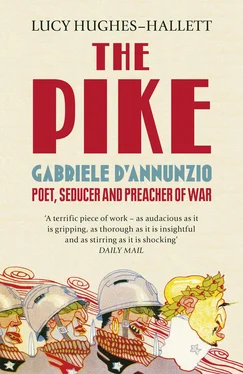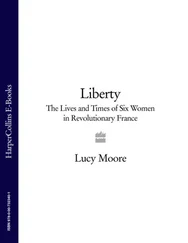Poets nowadays are of interest only to a minority. But d’Annunzio was a poet, novelist and playwright at a time when a writer could attract a mass following, and deploy significant political influence. On the opening night of his play Più Che l’Amore (More Than Love) there were calls for his arrest. After the premiere of La Nave (The Ship) the audience spilled out of the theatre and processed through the streets of Rome intoning a line from the play, a call to arms. When he gave readings, agents of foreign powers attended, fearful of his influence. When he wrote polemical poems, Italy’s leading newspaper cleared the front page and published them in full.
Italy was a new nation. Its southern half (the Bourbon Kingdom of the Two Sicilies) was annexed to the northern kingdom of Piedmont two and a half years before d’Annunzio’s birth. He was seven years old in 1870 when the French withdrew from Rome and the new country was complete. The heroes of the Risorgimento had made Italy. Now someone had to ‘make Italians’ (the phrase recurs in the political rhetoric of the period). D’Annunzio, after spending much of his twenties writing erotic lyrics in archaic verse-forms and Frenchified fiction, accepted the task. Goethe in Germany and Pushkin in Russia had been celebrated, not just as authors of fine literature, but as the creators of a new national culture. So would d’Annunzio be. ‘The voice of my race speaks through me,’ he claimed.
He was much admired by his peers. In his twenties he was one of the acknowledged leaders of the aesthetes. As he matured he wrote works which won admiration not only from his own generation, but also from his younger contemporaries. James Joyce called d’Annunzio the only European writer after Flaubert (and before Joyce himself) to carry the novel into new territory, and ranked him with Kipling and Tolstoy as the three ‘most naturally talented writers’ to appear in the nineteenth century. Proust declared himself ‘ravi’ by one of his novels. Henry James praised the ‘extraordinary range and fineness’ of his artistic intelligence.
But though he was an author first and foremost, d’Annunzio was never solely a man of letters. He wanted his words to spark uprisings and set nations ablaze. His most famous wartime exploits were those occasions when he flew over Trieste or Vienna, dropping not bombs (although he dropped those too), but pamphlets. For d’Annunzio, writing was a martial art.
He was a brilliant self-publicist. He associated himself with Garibaldi, the romantic hero of the Risorgimento, whose image – poncho, red shirt, the dash of the guerrilla fighter combined with the integrity of a secular saint – was as important to the cause of Italian unity as his military prowess. D’Annunzio borrowed the lustre of figures from the past: he also identified himself with the dynamism of the future. He had himself photographed alongside torpedo boats and aeroplanes and motor cars – sleek, trim and modern from his gleaming bald pate to the toes of his patent-leather boots. Looking back, in his years of retirement, he saw exactly what had been his greatest strength as a politician. ‘I knew how to give my action the lasting power of the symbol.’ The hero of his first novel learns that: ‘One must make one’s life as one makes a work of art.’ D’Annunzio himself worked ceaselessly on the marvellous artefact that was his own existence.
He made canny use of the brand new mass media. As a young man he was a prolific hack, pouring out reviews and gossip and fashion notes and quasi-autobiographical sketches. His more earnest-minded friends thought he was debasing himself, but he wrote that the seed of an idea, sown in a journal, would germinate and bear fruit in the public consciousness more quickly and surely than one planted in a book. He describes one of his fictional alter egos as being drawn to his public as a predator is drawn to its prey.
Reaching a mass audience, d’Annunzio became a new kind of public figure. The first television broadcasts were made only in the last years of his life, but his influence was akin to that of a modern mass-media pundit. Instead of looking up the social scale and the political hierarchy, seeking endorsement from the ruling class, he looked to the people, turning popularity into power. As the historian Emilio Gentile has put it, what fascism took from Fiume was not a political creed but ‘a way of doing politics’. That way has since become almost universal.
In December 1919, d’Annunzio called for a referendum in Fiume. The people were to decide whether he was to stay and rule them, or to be expelled from the city. He waited for the result of the vote sitting in a dimly lit restaurant, sipping cherry brandy with his supporters. He told them about a life-size wax effigy of himself that, so he claimed, was in a Parisian museum. Once his present adventure was concluded, he said, he would ask to be given the figure and seat it by the window of his house in Venice, so that gondoliers could point it out to tourists. He was aware that someone like himself had two existences, one as a private person, the other as a public image. He knew that his celebrity could be used – to amuse trippers, to make himself some cash, to boost an army’s morale, perhaps even to overthrow a government.
D’Annunzio’s story is worth telling for reasons beyond his great talent and his life’s drama, lurid and eventful though it is. It illustrates a strand of cultural history which has its apparently innocuous origins in the classical past, passes through the marvels of the Renaissance and the idealism of early nineteenth-century Romanticism, but which leads eventually to the jackboot and the manganello, the fascist club.
D’Annunzio read voraciously in several languages. He was adept at reviving neglected ideas whose time had come round again and he could spot a developing trend at the very moment of its formation. It is hard to find a cultural fad of the late nineteenth or early twentieth century which was not explored in his work. His flair for sensing what was new and influential moved Romain Rolland (a friend who became an enemy) to liken him to a pike, a predator lurking ‘afloat and still, waiting for ideas’. He was repeatedly accused of plagiarism, with some justice. He was a brilliant pasticheur, adopting and adapting the techniques of each new writer whose work impressed him. He wrote like Verga, he wrote like Flaubert, he wrote like Dostoevsky. But more intelligent critics noticed that he didn’t imitate so much as appropriate. When he saw something that could nourish his intellect drifting by on the current, he would snap at it, pike-like, and swallow it, and send it forth again better expressed.
He borrowed, but he also anticipated. Before Freud, he was fully aware of the nature of the excitement he derived from sleek machinery: the prow of a metal warship, he wrote, is ‘a monstrous phallic elongation’. Reading Nietzsche in the 1890s he recognised ideas already implicit in his own work. He had been modelling his verse on that of pre-Renaissance poets for a quarter of a century by the time Ezra Pound began to imitate the troubadours. He was writing about priapic fauns and pre-pagan ceremonies three decades before Nijinsky and Stravinsky sparked off a riot with The Rite of Spring. In 1888, a full two decades before Marinetti proclaimed a ruthless new machine-age aesthetic in the ‘Futurist Manifesto’, d’Annunzio wrote an ode to a torpedo. He loved motor cars and telephones and aeroplanes and machine guns. Marinetti’s manifesto is full of unacknowledged d’Annunzian sentiments, including the notion that civil society was so foul that only war could cleanse it.
His politics were as eclectic as his cultural tastes. He was not a party man, having far too lively a sense of his unique importance to subscribe to a programme imposed by others. Besides, the period when he was most active politically was a time when groups which would, only months after he marched on Fiume, separate out into mutually hostile phalanxes, made common cause, the extremes meeting to oppose the centre. Nationalism (now identified with the right) and syndicalism (leftist) were, according to one of d’Annunzio contemporaries, alike ‘doctrines of energy and the will’. Both preferred violence to negotiation; both understood the political process in terms, not of reason, but of myth. In a ‘venal and materialist society’ of democratic ‘stockbrokers and chemists’, they were heroic: the ‘only two aristocratic tendencies’. What mattered to d’Annunzio, and to the fascists after him, was not a theoretical programme, so much as style, vitality, vigour.
Читать дальше












